FREQUENTLY ASKED QUESTIONS:
Pain Relief with Massage, Pilates and Neuromuscular Therapy • Open 7 Days • Gift Certificates Available Online 24/7
Pregnancy massage reduces low back, buttock and lower limb pain caused by the increased pressures of birth weight. It increases the flow of blood and fluids in the tissues, decreases sleeplessness caused by the discomforts of pregnancy, and prepares the body for childbirth.
Sports massage gets the muscles ready for activity by increasing the delivery of nutrients and oxygen. It lengthens tight muscles so they can work more efficiently, increasing endurance. After a hard workout or event, it clears the soft tissues of toxins and waste products by increasing blood and lymph flow, reducing soreness from a hard workout or event.
